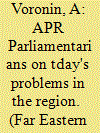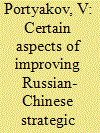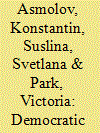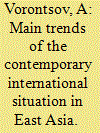|
|
|
Sort Order |
|
|
|
Items / Page
|
|
|
|
|
|
|
| Srl | Item |
| 1 |
ID:
079137


|
|
|
|
|
| Publication |
2007.
|
| Summary/Abstract |
The XV session of the Asia-Pacific Parliamentary Forum (APPF) was held in Moscow on January 22 - 25, 2007. The event was extraordinary not only by parliamentary but also by general Russian standards. For the first time, representatives from the highest legislative organs of 23 countries in the region gathered in Moscow for a comprehensive and thorough discussion of issues of common interest to the nations of the Asia-Pacific Region, and to draft a parliamentary program for joint efforts to combat contemporary challenges and threats
|
|
|
|
|
|
|
|
|
|
|
|
|
|
|
|
| 2 |
ID:
079136


|
|
|
|
|
| Publication |
2007.
|
| Summary/Abstract |
The disintegration of the USSR and the formation of the Russian Federation as an independent state have been the starting point of shaping and developing the present-day Russian-Chinese relations. This process has been going on for fifteen years according to its own logic and is largely determined by the modern national-state interests of Russia and China, as well as their place in the international division of labour and their geopolitical position. At the same time many important specific features of the modern Russian-Chinese relations can be adequately understood only in the context of the preceding intensive interaction of the two countries, whose history goes back about four hundred years
|
|
|
|
|
|
|
|
|
|
|
|
|
|
|
|
| 3 |
ID:
079139


|
|
|
|
|
| Publication |
2007.
|
| Summary/Abstract |
The leader published simultaneously on the first day of 2007 in three central North Korean newspapers, Rodong Sinmun, Choson Inmingun, and Ch'ongnyon Chonwi, proclaimed the year just past an "unprecedented period in the chronicle of the life-giving Korean revolution imbued with ideas, when the country's positions reached the heights of a majestic and mighty power, which became a demonstration of the grandeur of the Korean nation." Accordingly, the year that just began was heralded as a "year of continued fulfillment of the Great Leader's design for building a powerful Homeland, a year when the country as a whole is permeated with the spirit of fresh accomplishments."1
"Acquisition of nuclear deterrent forces" was named the main event of 2006 in North Korea. These forces, says the New Year Day article, "is a mighty factor against the double-standard approach and the policy of sanctions and strangulation on the part of the U.S., a boost to the cause of peace and security in Northeast Asia."2 According to North Korean reports, nearly 100,000 people took part in the demonstration staged in support of the nuclear tests conducted on October 20, 2006.3
The year 2006 changed little in the domestic situation, which remained stable. The government machinery hummed along, mainly for "protocol". New monuments continued to be put up, as usual, to celebrate an anniversary or mark a visit by Kim Il Sung or Kim Jong Il to a site. Gala meetings were held or national rallies called, which were, as a rule, addressed by government representatives. On January 26, for example, a national convention of public service, party, and nongovernmental organizations was treated to a speech by Yang Hyong Sop, Vice Chairman of the Presidium of the Supreme People's Assembly (SPA). A convention of activists of the Union of Agricultural Workers was hold
|
|
|
|
|
|
|
|
|
|
|
|
|
|
|
|
| 4 |
ID:
079138


|
|
|
|
|
| Publication |
2007.
|
| Summary/Abstract |
That the economy of East Asia is growing at the quickest rate, and this region has transformed itself into one of the world's leading economic centers, has long been a generally accepted postulate among today's political scientists. This is explained by the continuing intense interest in the processes now under way in the region. The present-day international situation in the East Asia region is characterized by dynamism, nonuniformity of development, and the simultaneous appearance of both centrifugal and centripetal tendencies, all of which create a state of fluidity and instability
|
|
|
|
|
|
|
|
|
|
|
|
|
|
|
|
| 5 |
ID:
079141


|
|
|
|
|
| Publication |
2007.
|
| Summary/Abstract |
Specific regional identity of Russians living in Russian Far Eastern areas is a hard fact of Russian social reality. Alongside natural reasons inherent in their makeup, such as the high costs of traveling westward to anywhere in Russia or going back, the region's deep involvement in the life of Northeast Asia is a major factor that makes the social psychology of its residents increasingly more different from that of Russians living in the country's European part. It is commonplace for many Russians living in the Far East, especially for the younger generation, to travel frequently to China and other NEA countries, without once going to their country's western parts.
Ongoing contacts with foreigners, for the most part in China, Japan, and South Korea, and livelihoods and daily comforts that depend on political and economic links with those countries must, in our view, give Far Easterners their own sense of the role Russia is playing in today's world. It is our purpose here to give an overview of the geopolitical ideas residents of the country's Far Eastern fringes have formed about Russia's role and place in the Asia-Pacific Region (APR).
To build an empirical framework for this article, this author used the statistics contained in the questionnaires he received from 1,283 respondents in six areas of the Far East under the presidential grant, MK-987.2005.6, to support young Russian scholars. Circulating questionnaires was the first step of the study, which also included interviews with experts and press content analysis.
|
|
|
|
|
|
|
|
|
|
|
|
|
|
|
|
| 6 |
ID:
079140


|
|
|
|
|
| Publication |
2007.
|
| Summary/Abstract |
One of the highest-priority goals in the foreign policy of the Republic of Korea is to guarantee long-term peace on the Korean Peninsula and achieve mutual prosperity for South and North Korea, thereby laying the foundations for a final peaceful reunification. The Korean government is seeking ways to contribute to the world's common prosperity by consolidating farsighted relations of collaboration with other nations. The Republic of Korea contributes to international efforts aimed at realizing universal values and solving global problems. In addition, the Korean government tries to ensure a high level of trust in the international arena when fulfilling its obligations. The government of the Republic of Korea also plays a genuine role in the activities of various organizations for regional security, in full accordance with the world trends associated with the deepening of regional ties.
What are Korea's main problems in guaranteeing security? The most important of these is the military threat from North Korea1 Around two million troops are arrayed against one another in the Demilitarized Zone. North Korean long-range artillery units are strategically deployed all along the DMZ, and Seoul lies within their zone of fire. The second North Korean nuclear crisis has also become a potential threat that could sharply exacerbate both the situation and the balance of forces on the Korean Peninsula. In addition to the nuclear problem, another potential threat to the security of the Republic of Korea is associated with the various domestic difficulties inside North Korea, and these are also impossible to underestimate.
Not long ago, during general officer-level military talks between North and South Korea, both Koreas made progress in reaching an agreement to prevent accidental conflicts in the Western Sea. A long road must yet be traveled, however, before an atmosphere of mutual trust can be achieved in military matters
|
|
|
|
|
|
|
|
|
|
|
|
|
|
|
|
|
|
|
|
|